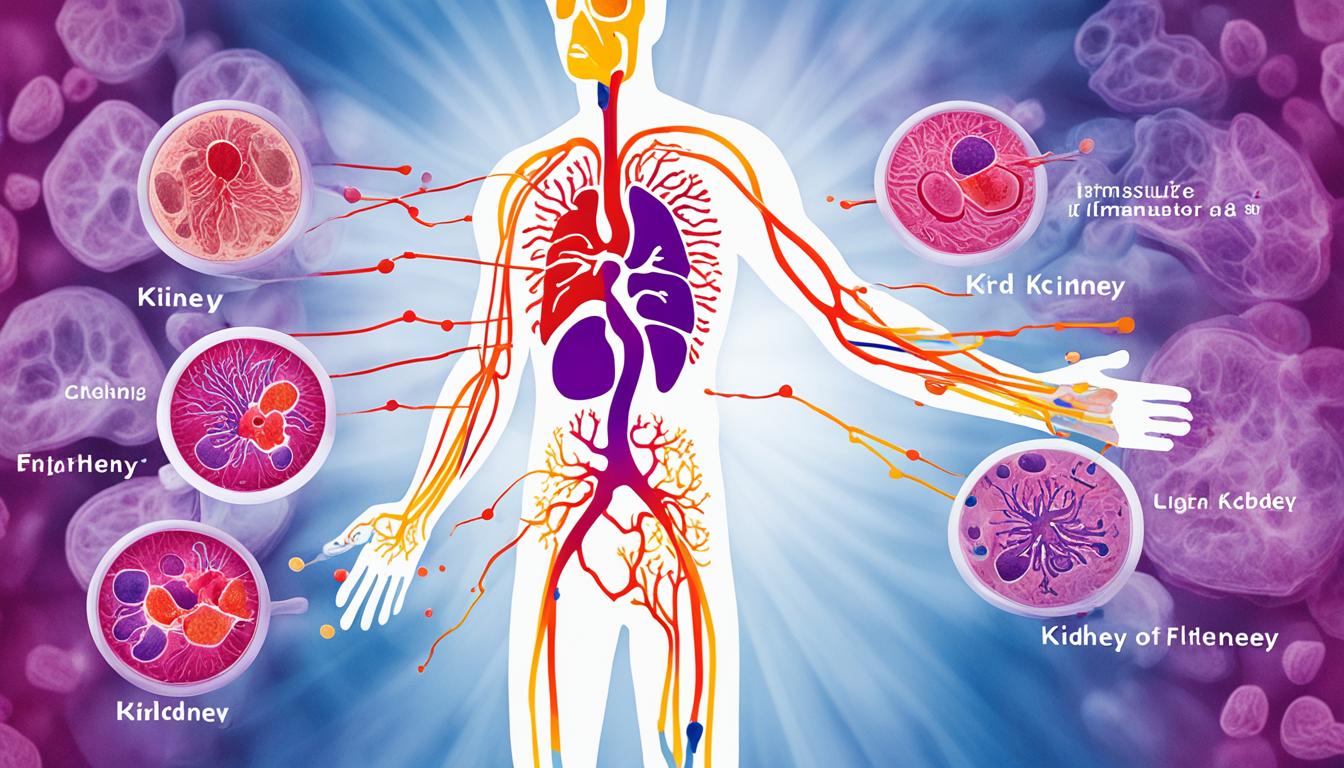Chronic kidney disease (CKD) is a major global health issue. It ranks among the top causes of death worldwide. CKD leads to a slow loss of kidney function over time. Diabetes and high blood pressure are the main causes, damaging the kidneys’ sensitive filters.
It’s key to know CKD’s symptoms for early action. Signs include feeling very tired, making less urine, and breathlessness. Without treatment, CKD might reach a stage where it’s life-threatening. At this point, dialysis or a kidney transplant becomes necessary.
Standard treatments like drugs and lifestyle changes help, but now there’s interest in another way: stem cell therapy. Scientists are focusing on using mesenchymal stem cells (MSCs) to reduce kidney inflammation and help repair tissues. The hope is that stem cell therapy can boost kidney health and cut down on inflammation in CKD patients.
Key Takeaways:
- Chronic kidney disease (CKD) is a big health issue and often fatal.
- It shows symptoms such as tiredness, less urine, and trouble breathing.
- Diabetes and high blood pressure are the top causes of CKD.
- Spotting CKD early and acting fast is crucial to avoid severe stages.
- Mesenchymal stem cell therapy shows potential to help those with CKD.
Types of Renal Diseases and Conventional Treatment Options
There are two main types of renal diseases: acute kidney injury (AKI) and chronic kidney disease (CKD). AKI involves a sudden and severe kidney function loss. It can happen because of sudden lack of blood flow or harmful drugs. Meanwhile, CKD is a long-term problem leading to slow kidney damage.
Millions around the world suffer from kidney disease. It’s a top cause of death. The rise in CKD cases shows we must know more about its symptoms and how to treat it.
Acute Kidney Injury (AKI)
AKI means your kidneys suddenly work less within a short time. This can be due to many causes, like lack of blood flow or certain drugs.
For AKI, quick diagnosis and treatment matter a lot. The focus is on fixing the main issue, getting electrolytes right, and keeping body fluids in check.
Chronic Kidney Disease (CKD)
CKD is a gradually worsening problem where kidneys can’t clean waste from blood well. It often leads to health issues.
CKD is linked to various risks:
- Diabetes
- High blood pressure
- Obesity
- Smoking
Treatments for CKD try to slow it down, control its symptoms, and stop problems. They include:
- Drugs for blood pressure and for other diseases
- A healthy diet and regular exercise
- Dialysis, cleansing the blood artificially
- Kidney transplant, which replaces the failing kidney
Each person with CKD needs a unique treatment plan. It depends on their condition.
| Type of Renal Disease | Characteristics |
|---|---|
| Acute Kidney Injury (AKI) | Sudden, severe loss of kidney function |
| Chronic Kidney Disease (CKD) | Gradual decline in kidney function over time |
Stem Cell Therapy for Kidney Disease
Using mesenchymal stem cells (MSCs) shows hope for those with kidney disease. These cells can lower inflammation and spark healing. This means treatment might improve how the kidneys work.
MSCs are special because they can become different cell types. This includes those found in kidneys. By doing this, they might help heal kidney problems.
One big benefit is their power to calm kidney inflammation. This is key for fighting chronic kidney disease. MSCs’ ability to ease the immune response can lessen this inflammation.
Stem cell therapy can work alone or with other treatments like transplants. This mix might offer better healing and kidney repair. It combines the strengths of stem cells with the benefits of common medicines.
Current Research and Future Potential
Teams are hard at work to learn more about using stem cells for kidney disease. They’re focusing on the best ways to give MSCs and what outcomes to expect.
Advances in stem cell science may lead to new methods for kidney repair. Experts aim to make MSCs stay in the kidney longer and work even better. We could see big steps in treatment.
Though early, stem cell therapy for kidney issues is promising. With more study, it might become a main treatment. This could change many lives for the better.
Conclusion
Stem cell therapy shows great promise for treating kidney disease. It uses the regenerative power of mesenchymal stem cells. This method could lessen inflammation, aid kidney repair, and boost kidney function in those with chronic kidney issues.
Though we need more studies to understand its full benefits, early results are promising. Advancements in stem cell technology point to better treatments for kidney problems ahead.
The future looks bright for using stem cell therapy to treat kidney diseases. But, it’s crucial to do more research and tests to confirm its safety and effectiveness. As experts continue to push the field forward, we’re hopeful that stem cell therapy will change how we manage kidney diseases in the future.

